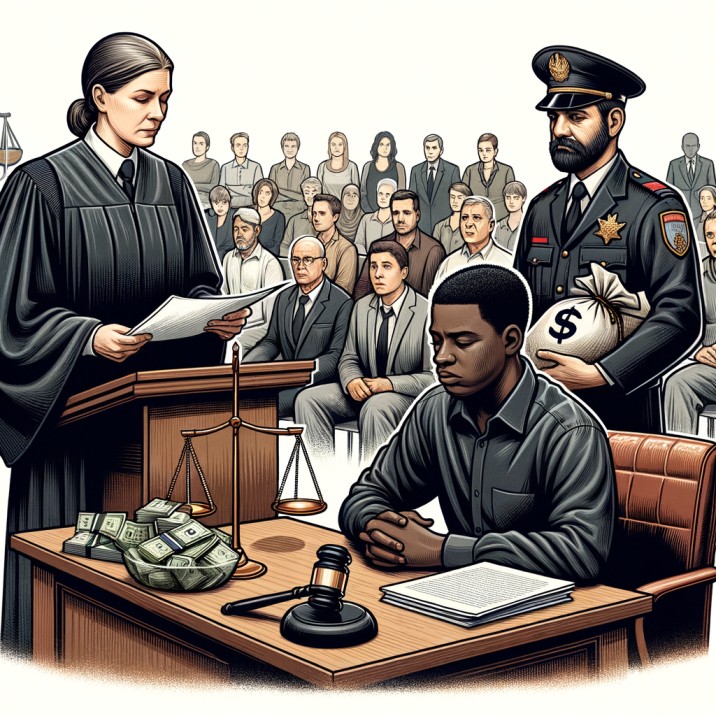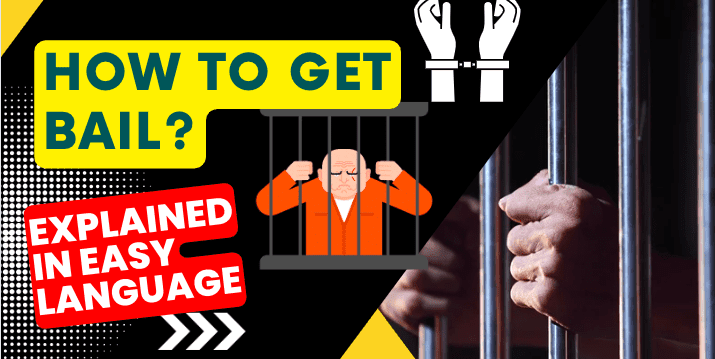When individuals find themselves facing legal troubles and are awaiting trial, understanding the bail and bail bond process becomes crucial. This comprehensive guide aims to shed light on the intricacies of bail, the role of bail bonds, and the steps involved in securing release from custody.
Introduction:
If you find yourself or a loved one facing legal troubles, understanding the bail and bail bond process becomes crucial. Bail serves as a means to secure temporary release from custody while awaiting trial, ensuring that individuals are not unjustly held before their case is heard. In this article, we will provide an in-depth explanation of the bail and bail bond process, shedding light on its significance and procedures. By the end, you will have a clear understanding of this essential legal process.
Bail and Bail Bond Process explained

Section 1: What is Bail?
This section provides a definition of bail and explains its purpose. It also explores the various types of bail available, such as cash bail, property bond, and surety bond. Additionally, it discusses the factors that judges consider when determining bail amounts, such as the severity of the crime, flight risk, and ties to the community.
Section 2: The Bail Process:
This section walks the reader through the step-by-step process involved in obtaining bail. It covers the initial arrest and booking procedures, the importance of a bail hearing, and the different conditions that may be imposed upon release. It also highlights the roles of defense attorneys and bail bond agents in assisting with the bail process.
Section 3: Understanding Bail Bonds:
This section focuses on bail bonds, explaining how they work as an alternative to paying the full bail amount. It clarifies the roles and responsibilities of the defendant, co-signer, and bail bondsman. The section also discusses the fees and collateral associated with obtaining a bail bond.
Section 4: Common Questions about Bail:
In this section, the article addresses common questions and concerns that individuals may have about the bail process. It provides clear answers to queries such as “What happens if bail is denied?” and “What happens if the defendant fails to appear in court?” This section aims to alleviate any uncertainties or misconceptions about the bail process.
Conclusion:
The bail and bail bond process is a vital aspect of the legal system, ensuring that individuals are not unnecessarily incarcerated before their trial. By understanding bail, the bail process, and the role of bail bonds, individuals can navigate this complex process more efficiently.
FAQ (FREQUENTLY ASKED QUESTIONS)
- What is bail?
Answer: Bail is a financial arrangement that allows a person accused of a crime to be temporarily released from custody while awaiting trial. - How does bail work?
Answer: Bail works as a guarantee that the accused person will appear in court for their scheduled hearings. - What are the types of bail?
Answer: The types of bail include cash bail, property bond, and surety bond. - What factors determine the bail amount?
Answer: Factors such as the severity of the crime, flight risk, and ties to the community are considered when determining the bail amount. - Can bail be denied?
Answer: Yes, in certain cases, bail can be denied if the judge deems the accused a flight risk or a danger to the community. - What is a bail hearing?
Answer: A bail hearing is a court proceeding where the judge determines whether the accused should be granted bail and at what amount. - What happens if bail is denied?
Answer: If bail is denied, the accused remains in custody until their trial. - What is an arraignment?
Answer: An arraignment is a court hearing where the accused is formally charged and enters a plea. - What is a bail bond?
Answer: A bail bond is a contract between the defendant, a co-signer, and a bail bondsman, ensuring the defendant’s appearance in court. The bondsman pays the bail on behalf of the defendant. - How does a bail bond work?
Answer: A bail bond allows the defendant to pay a percentage of the bail amount to a bail bondsman. In return, the bondsman provides a guarantee to the court for the defendant’s appearance. - What are the fees associated with a bail bond?
Answer: The fee for a bail bond is usually a certain percentage of the total bail amount, typically 10% to 15%. - What happens if the defendant fails to appear in court after posting bail?
Answer: If the defendant fails to appear in court, a warrant may be issued for their arrest, and they may forfeit the bail amount. - Can bail be revoked?
Answer: Yes, if the defendant violates the conditions of their bail, such as committing another crime or failing to appear in court, their bail can be revoked. - How long does it take to get released from custody after bail is posted?
Answer: The time for release after posting bail varies depending on the circumstances and processing time at the facility. - Can bail be paid in installments?
Answer: Some jurisdictions may allow bail to be paid in installments, while others require the full amount upfront. - Can the bail amount be reduced?
Answer: Yes, the defense attorney can file a motion to reduce the bail amount, presenting arguments to the court for reconsideration. - Are bail bonds refundable?
Answer: No, the fee paid to the bail bondsman is non-refundable, even if the defendant appears in court as required. - Can someone with no criminal record get bail easily?
Answer: In general, a clean criminal record can be a favorable factor in obtaining bail, but other considerations may also influence the decision. - What is a bail conditions hearing?
Answer: A bail conditions hearing is where the court sets specific conditions that the defendant must meet while out on bail, such as checking in with a probation officer or refraining from contacting certain individuals. - Can the bail amount be too high for someone to afford?
Answer: In some cases, the bail amount set by the court may be too high for the accused person to afford. In such situations, they may seek a bail reduction hearing or explore other options with their attorney. - Can non-US citizens get bail?
Answer: Yes, non-US citizens can request bail, but certain factors such as flight risk and immigration status may be considered in the decision-making process. - Can bail be paid with a credit card?
Answer: In some cases, bail can be paid with a credit card, depending on the policies of the jurisdiction or the bail bondsman. - Can bail be provided for any type of offense?
Answer: Bail is generally available for both misdemeanor and felony offenses, but certain serious crimes may be non-bailable. - What is a bail forfeiture?
Answer: Bail forfeiture occurs when the defendant fails to appear in court, leading to the loss of the bail amount. - Can bail be paid by someone other than the defendant?
Answer: Yes, anyone can post bail on behalf of the defendant, such as family members or friends, as long as they meet the requirements set by the court. - Can a bail bond be revoked?
Answer: Yes, a bail bond can be revoked if the defendant violates the conditions of their release or if the bond agreement terms are breached. - Can bail be granted for someone with a history of bail violations?
Answer: A history of bail violations can make it challenging to secure bail. However, it is ultimately up to the judge’s discretion. - Can bail be granted during weekends or holidays?
Answer: Yes, bail can be granted during weekends or holidays, as arrests can occur at any time. Courts may have specific procedures for bail hearings during non-business hours. - Can bail be obtained for federal offenses?
Answer: Yes, bail can be obtained for federal offenses, but the process may differ from that of state offenses. - Can the bail amount be returned after the case is resolved?
Answer: Yes, once the case is resolved, and the defendant has complied with all court appearances and conditions, the bail amount, minus any fees or outstanding obligations, is typically returnedSources:-














